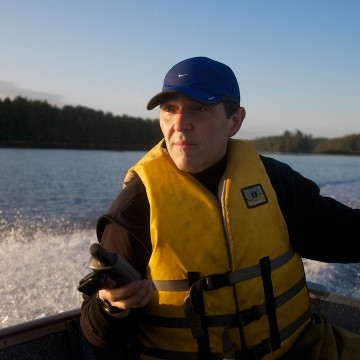
hagwil hayetsk (Charles Menzies)
Professor in the Department of Anthropology, UBC
Contact Details
Website www.charlesmenzies.ca
Email charles.menzies[at]ubc.ca
Bio
hagwil hayetsk (Charles Menzies) is a member of Gitxaała Nation and an enrolled member of the Tlingit and Haida Tribes of Alaska. He is currently a Professor in the Department of Anthropology at the University of British Columbia in Vancouver, BC. He is not appointed at IRES and instead is a Faculty Associate of our unit. Please contact the Department of Anthropology to reach him.
B.A.(Simon Fraser University), M.A. (York University), M.Phil., Ph.D. (Anthropology Program, the Graduate School and University Center of the City University of New York).
Professor hagwil hayetsk (Menzies) served as an elected member of the UBC Board of Governors, 2017-2020. Menzies is currently an elected joint-faculties senator on the UBC-V Senate, 2020-2026. Commentary and news can be found on his personal blog [click here].
Research Interests
Professor hagwil haeyetsk (Menzies)’ primary research interests are the production of anthropological films, natural resource management (primarily fisheries related), political economy, contemporary First Nations’ issues, maritime anthropology and the archaeology of north coast BC. He has conducted field research in, and has produced films concerning, north coastal BC, Canada (including archaeological research); Brittany, France; and Donegal, Ireland.
His current research project, Laxyuup Gitxaaɫa, combines archaeological and socio-cultural anthropology to document the traditional territory of Gitxaaɫa Nation. Other projects include founding and directing the Ethnographic Film Unit at UBC, establishing an online journal, New Proposals, and acting as the coordinator of an ecological anthropology research group at UBC, Forests and Oceans for the Future
Graduate Supervision
Graduate student mentorship and supervision is a key focus of my scholarly practice. Typically master’s students work with projects that I have underway or that are closely associated thematically. Doctoral students, while focusing on projects with affinities to my research, pursue more independent projects. I’ve had the privilege of working with a great number of outstanding students. Many of their projects are focused on natural resource management (fisheries and forestry), others explore the dynamics of municipal politics, local development projects at UBC, climate change artists, and food security. Today these scholars are working in NGO’s, government agencies, universities and colleges. Listed below are dissertations and theses completed by this outstanding and excellent group.
Doctoral Dissertations
- Sarah Grace Fessenden. 2017. We just wanna warm some bellies: Food Not Bombs, anarchism, and recycling wasted food for protest.
- Denise Nicole Green. 2014. Producing Materials, Places and Identities: A Study of Encounters in theAlberni Valley
- Janalyn Gail Kotaska. 2013. Reconciliation at the end of the day: decolonizing territorial governance in British Columbia after Delgamuukw
- Rachel Donkersloot. 2011. What keeps me here: gendered and generational perspectives on rural life and leaving in an Irish fishing locale.
- Caroline F. Butler. 2005. More than fish : political knowledge in the commercial fisheries of British Columbia.
- Kimberly Linkous Brown. 2005. To fish for themselves: a study of accommodation and resistance in the Stó:lō fishery.
Master’s Theses
- Katrin Schmid. 2020. Being Thorough: Cumulative Effects in Resurgent Gitxaała.
- Ada Parkhurt Smith. 2018. Toward decolonizing food literacy education: co-creating a curriculum at Lach Klan School with Gitxaala Nation.
- Celia Brauer. 2017. Paths to Sustainability:creating connections through place-based Indigenous knowledge.
- Marie-Elise Laforest. 2017. Gitxaała sovereignty: indigenous governance and industrial development.
- Jory Stariwat. 2016.Regulatory impacts on a Yup’ik fish camp in Southwest Alaska.
- Danielle Gendron. 2016.Eating Gitxaała, being Gitxaała: food and cultural security.
- Daniel Frim. 2015. Encountering the K’I’s A’ums: Reinterpretations of the Spirit Quest in Three 21st-Century Kwakwaka’wakw Narratives.
- Naomi H Smethurst. 2014. Inscribed on the landscape: stories of stone traps and fishing in Laxyuup Gitxaała
- Lauren Sacha Rodman. 2013. Spinning wind into power: industry and energy in Gitxaała Nation, British Columbia.
- Jonathon William Irons. 2012 (David Pokotylo, Primary supervisor). Ethnographic perspectives on Laxyuup Gitxaała.
- Morgan Elizabeth Moffit. 2012. Gitxaała marine use planning: making indigenous jurisdiction in contemporary aboriginal-state relations.
- Claudia Morgado. 2012. Getting to know the artist: understanding why artists are important contributors to the climate change conversation.
- Jennifer Wolowic. 2008. Research tools or collaborative toys? cameras and participatory research with youth.
- Jessica Rogers. 2007. Reshaping Crown-First Nation relationships amid changing contexts: an examination of the intersection between the Crown’s promise of a New Relationship and the implementations of the Forest and Range Agreement.
- Robin Anderson. 2007. Diabetes in Gitxaała: colonization, assimilation, and economic change.
- Sharon Anne Peterson. 2006. The politics of fit: the genesis of candidacy in a suburban municipality.
- Natalie Hemsing. 2005. Production of place: community, conflict and belonging at Wreck Beach.
- Morgan E. Smith. 2003. Managing by the numbers? examining barriers to harvest assessment in a Southeast Alaska subsistence salmon fishery.
- Lilian C. De La Peña. 2001. The rhetoric of co-management in Philipine fisheries.
- Atsuko Hasegawa. 2001. The situation and the evolution of forest management by Aboriginal people in British Columbia.
- Caroline F. Butler. 1998. Regulating tradition: Stó:lō wind drying, and aboriginal rights.